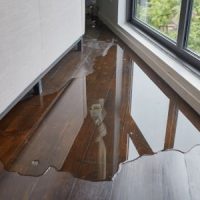Who Pays For Water Damage To Condominiums?

In general, a condominium owner is responsible for maintaining everything between the roof and the walls of their unit. However, if there is water damage from a storm, or from the upstairs unit, the situation becomes more complex. If you are in this situation, it is a good idea to consult with a condominium law attorney as you seek options, so that you are aware of your rights and responsibilities.
Who Is Responsible For What?
In these situations, there are usually three separate actors, all of whom will likely want different things: the owner or owners whose units were damaged by the water, the condo association, and the owner or owners who allegedly caused the leak (if applicable; in theory, no one ‘causes’ storm damage, unless through negligence). Depending on the specific facts of the situation, any or all of them may wind up footing the bill for repairs, though it is a reasonable assumption to state that the association will foot some of the bill – if water seeps into a unit from above, it means that the water had to travel through the common elements between the units, which are the association’s responsibility.
That said, every condominium association may define ‘common elements’ differently. Florida law establishes a baseline, but sometimes there is room for discussion – for example, the common elements are said to stop at a unit’s perimeter walls, but does that mean at the paint, at the drywall, or elsewhere? In addition, condo association declarations may clarify what constitutes a limited common element (as opposed to a standard common element) – and limited common elements are usually the responsibility of the unit owner, not the association.
Negligence May Shift Obligations
While the association is responsible for repairs to the common elements, everything (or almost everything) within the unit is the responsibility of the unit owner, including personal property, fixtures, and appliances. However, if the unit owner can establish that an outside actor’s negligence directly caused the damage to the condo – such as another unit owner leaving a faucet on, to use one example – then it is that owner who would be potentially liable for the damages. Bringing such a case under a theory of negligence in Florida is relatively straightforward, though not always easy.
In order to establish another party’s negligence, one must establish three criteria:
- A breach of the duty to exercise reasonable care that condo owners and their association all owe to each other;
- Tangible damages;
- Directly caused by the breach of duty.
Causation can be the trickiest criterion to establish in many cases, as it is not always possible to isolate the direct cause of a water leak – was it a storm, or was it the upstairs tenant’s poorly maintained flooring? However, if you have evidence of another actor’s negligence, it will be that person or people who foot the bills for your repairs.
Contact A Tampa Condominium Association Attorney
If you have suffered a water leak in your condominium, it is important to be aware of your rights and responsibilities with regard to the law and your condo association’s declaration and bylaws. If you have questions, a Tampa condominium association attorney from the Seward Law Office may be able to assist in getting them answered. Call our office today to schedule a consultation.
Source:
flsenate.gov/Laws/Statutes/2021/718.113
